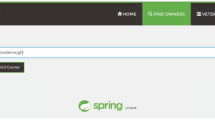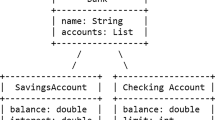Abstract
Modeling is requiring increasingly larger efforts while becoming indispensable given the complexity of the problems we are solving. Modelers face high cognitive load to understand a multitude of complex abstractions and their relationships. There is an urgent need to better support tool builders to ultimately provide modelers with intelligent modeling assistance that learns from previous modeling experiences, automatically derives modeling knowledge, and provides context-aware assistance. However, current intelligent modeling assistants (IMAs) lack adaptability and flexibility for tool builders, and do not facilitate understanding the differences and commonalities of IMAs for modelers. Such a patchwork of limited IMAs is a lost opportunity to provide modelers with better support for the creative and rigorous aspects of software engineering. In this expert voice, we present a conceptual reference framework (RF-IMA) and its properties to identify the foundations for intelligent modeling assistance. For tool builders, RF-IMA aims to help build IMAs more systematically. For modelers, RF-IMA aims to facilitate comprehension, comparison, and integration of IMAs, and ultimately to provide more intelligent support. We envision a momentum in the modeling community that leads to the implementation of RF-IMA and consequently future IMAs. We identify open challenges that need to be addressed to realize the opportunities provided by intelligent modeling assistance.

Similar content being viewed by others
References
AI4AUI: Workshop on AI Methods for Adaptive User Interfaces (2020). https://doi.org/10.1145/3306307.3328180
Agt-Rickauer, H., Kutsche, R., Sack, H.: Domore—a recommender system for domain modeling. In: Proceedings of the 6th International Conference on Model-Driven Engineering and Software Development (MODELSWARD’18), pp. 71–82 (2018). https://doi.org/10.5220/0006555700710082
Bakar, N.H., Kasirun, Z.M., Salleh, N.: Feature extraction approaches from natural language requirements for reuse in software product lines: a systematic literature review. J. Syst. Softw. 106(C), 132–149 (2015). https://doi.org/10.1016/j.jss.2015.05.006
Baki, I., Sahraoui, H.A.: Multi-step learning and adaptive search for learning complex model transformations from examples. ACM Trans. Softw. Eng. Methodol. 25(3), 20:1–20:37 (2016)
Beth Kery, M., Myers, B.A.: Exploring exploratory programming. In: 2017 IEEE Symposium on Visual Languages and Human-Centric Computing (VL/HCC), pp. 25–29 (2017)
Bruch, M., Monperrus, M., Mezini, M.: Learning from examples to improve code completion systems. In: van Vliet, H., Issarny, V. (eds.) Proceedings of the 7th Joint Meeting of the European Software Engineering Conference and the ACM SIGSOFT International Symposium on Foundations of Software Engineering, 2009, Amsterdam, The Netherlands, August 24–28, 2009, pp. 213–222. ACM (2009). https://doi.org/10.1145/1595696.1595728
Bucchiarone, A., Cabot, J., Paige, R., Pierantonio, A.: Grand challenges in model-driven engineering: an analysis of the state of the research. Softw. Syst. Model. 19, 1–9 (2020). https://doi.org/10.1007/s10270-019-00773-6
Burgueño, L., Cabot, J., Gérard, S.: An LSTM-based neural network architecture for model transformations. In: 2019 ACM/IEEE 22nd International Conference on Model Driven Engineering Languages and Systems (MODELS), pp. 294–299. IEEE (2019)
Combemale, B., Kienzle, J., Mussbacher, G., Ali, H., Amyot, D., et al.: A Hitchhiker’s guide to model-driven engineering for data-centric systems. IEEE Softw. (2020). https://doi.org/10.1109/MS.2020.2995125. https://hal.inria.fr/hal-02612087
Danylenko, A., Löwe, W.: Context-aware recommender systems for non-functional requirements. In: 2012 Third International Workshop on Recommendation Systems for Software Engineering (RSSE), pp. 80–84 (2012). https://doi.org/10.1109/RSSE.2012.6233417
Derakhshanmanesh, M., Ebert, J., Grieger, M., Engels, G.: Model-integrating development of software systems: a flexible component-based approach. Softw. Syst. Model. 18(4), 2557–2586 (2019)
Elkamel, A., Gzara, M., Ben-Abdallah, H.: An UML class recommender system for software design. In: 2016 IEEE/ACS 13th International Conference of Computer Systems and Applications (AICCSA), pp. 1–8 (2016). https://doi.org/10.1109/AICCSA.2016.7945659
France, R., Rumpe, B.: Model-driven development of complex software: a research roadmap. In: Future of Software Engineering (FOSE ’07), pp. 37–54 (2007)
Friedrich, F., Mendling, J., Puhlmann, F.: Process model generation from natural language text. In: International Conference on Advanced Information Systems Engineering (CAISE), pp. 482–496. Springer, Berlin (2011)
Hartmann, T., Moawad, A., Fouquet, F., Le Traon, Y.: The next evolution of MDE: a seamless integration of machine learning into domain modeling. In: 2017 ACM/IEEE 20th International Conference on Model Driven Engineering Languages and Systems (MODELS), pp. 180–180 (2017). https://doi.org/10.1109/MODELS.2017.32
Ibrahim, M., Ahmad, R.: Class diagram extraction from textual requirements using natural language processing (NLP) techniques. In: Proceedings of the 2nd International Conference on Computer Research and Development, pp. 200–204 (2010). https://doi.org/10.1109/ICCRD.2010.71
Josifovska, K., Yigitbas, E., Engels, G.: A digital twin-based multi-modal UI adaptation framework for assistance systems in industry 4.0. In: HCI (3), Lecture Notes in Computer Science, vol. 11568, pp. 398–409. Springer, Berlin (2019)
Kaiser, G.E., Feiler, P.H., Popovich, S.S.: Intelligent assistance for software development and maintenance. IEEE Softw. 5(3), 40–49 (1988). https://doi.org/10.1109/52.2023
Karimi, J., Konsynsky, B.R.: An automated software design assistant. IEEE Trans. Softw. Eng. 14(2), 194–210 (1988). https://doi.org/10.1109/32.4638
Kienzle, J., Mussbacher, G., Combemale, B., Bastin, L., Bencomo, N., et al.: Towards model-driven sustainability evaluation. Commun. ACM 63(3), 80–91 (2020). https://doi.org/10.1145/3371906
Knuth, D.E.: Literate programming. Comput. J. 27(2), 97–111 (1984). https://doi.org/10.1093/comjnl/27.2.97
Kögel, S.: Recommender system for model driven software development. In: 11th Joint Meeting on Foundations of Software Engineering, ESEC/FSE 2017, pp. 1026–1029. Association for Computing Machinery, New York (2017). https://doi.org/10.1145/3106237.3119874
Kuschke, T., Mäder, P.: Pattern-based auto-completion of uml modeling activities. In: Proceedings of the 29th ACM/IEEE International Conference on Automated Software Engineering, ASE ’14, pp. 551–556. Association for Computing Machinery, New York (2014). https://doi.org/10.1145/2642937.2642949
Liew, A.: DIKIW: data, information, knowledge, intelligence, wisdom and their interrelationships. Bus. Manag. Dyn. 2, 49 (2013)
Liu, C., Yang, D., Zhang, X., Ray, B., Rahman, M.M.: Recommending github projects for developer onboarding. IEEE Access 6, 52082–52094 (2018). https://doi.org/10.1109/ACCESS.2018.2869207
Mazak, A., Wolny, S., Wimmer, M.: On the need for data-based model-driven engineering, pp. 103–127 (2019). https://doi.org/10.1007/978-3-030-25312-7_5
McDirmid, S.: Living it up with a live programming language. In: Proceedings of the 22nd Annual ACM SIGPLAN Conference on Object-Oriented Programming Systems and Applications, OOPSLA ’07, pp. 623–638. Association for Computing Machinery, New York (2007). https://doi.org/10.1145/1297027.1297073
Mendix Assist: https://www.mendix.com/blog/introducing-ai-assisted-development-to-elevate-low-code-platforms-to-the-next-level
Mussbacher, G., Amyot, D., Breu, R., Bruel, J.M., Cheng, B., et al.: The relevance of model-driven engineering 30 years from now (2014). https://doi.org/10.1007/978-3-319-11653-2_12
Pérez-Soler, S., Daniel, G., Cabot, J., Guerra, E., de Lara, J.: Towards automating the synthesis of chatbots for conversational model query. In: Proceedings of the International Conference on Exploring Modeling Methods for Systems Analysis and Development (2020). (To appear)
Pérez-Soler, S., Guerra, E., de Lara, J.: Collaborative modeling and group decision making using chatbots in social networks. IEEE Softw. 35(6), 48–54 (2018). https://doi.org/10.1109/MS.2018.290101511
Ricci, F., Rokach, L., Shapira, B.: Introduction to Recommender Systems Handbook, pp. 1–35. Springer US, Boston (2011). https://doi.org/10.1007/978-0-387-85820-3_1
Robillard, M.P., Maalej, W., Walker, R.J., Zimmermann, T.: Recommendation Systems in Software Engineering. Springer Publishing Company, Incorporated, Berlin (2014)
Rocha, A., Papa, J.P., Meira, L.A.A.: How far you can get using machine learning black-boxes. In: 2010 23rd SIBGRAPI Conference on Graphics, Patterns and Images, pp. 193–200 (2010). https://doi.org/10.1109/SIBGRAPI.2010.34
Rovatsos, M., Weiss, G.: Autonomous Software, pp. 63–84. https://doi.org/10.1142/9789812775245_0003
Sen, S., Baudry, B., Vangheluwe, H.: Towards domain-specific model editors with automatic model completion. Simulation 86(2), 109–126 (2010). https://doi.org/10.1177/0037549709340530
ServiceStudio from OutSystems: https://www.outsystems.com/ai
Silva, R., Roy, C., Rahman, M., Schneider, K., Paixao, K., Maia, M.: Recommending comprehensive solutions for programming tasks by mining crowd knowledge. In: 27th International Conference on Program Comprehension (ICPC), pp. 358–368. IEEE, Association for Computing Machinery (2019)
Subramaniam, K., Liu, D., Far, B.H., Eberlein, A.: UCDA: use case driven development assistant tool for class model generation. In: SEKE (2004)
Svyatkovskiy, A., Zhao, Y., Fu, S., Sundaresan, N.: Pythia: AI-assisted code completion system. In: Proceedings of the 25th ACM SIGKDD International Conference on Knowledge Discovery and Data Mining, KDD ’19, pp. 2727–2735. Association for Computing Machinery (2019). https://doi.org/10.1145/3292500.3330699
Thummalapenta, S., Xie, T.: Parseweb: a programmer assistant for reusing open source code on the web. In: Proceedings of the Twenty-Second IEEE/ACM International Conference on Automated Software Engineering, ASE ’07, pp. 204–213. Association for Computing Machinery, New York (2007). https://doi.org/10.1145/1321631.1321663
Timm, I.J., Knirsch, P., Kreowski, H.J., Timm-Giel, A.: Autonomy in Software Systems, pp. 255–273. Springer, Berlin (2007). https://doi.org/10.1007/978-3-540-47450-0_17
Tran, Q., Chung, L.: NFR-assistant: tool support for achieving quality. In: Proceedings 1999 IEEE Symposium on Application-Specific Systems and Software Engineering and Technology. ASSET’99 (Cat. No.PR00122), pp. 284–289 (1999). https://doi.org/10.1109/ASSET.1999.756782
Whittle, J., Hutchinson, J., Rouncefield, M.: The state of practice in model-driven engineering. IEEE Softw. 31(3), 79–85 (2014)
Author information
Authors and Affiliations
Corresponding author
Additional information
Publisher's Note
Springer Nature remains neutral with regard to jurisdictional claims in published maps and institutional affiliations.
Rights and permissions
About this article
Cite this article
Mussbacher, G., Combemale, B., Kienzle, J. et al. Opportunities in intelligent modeling assistance. Softw Syst Model 19, 1045–1053 (2020). https://doi.org/10.1007/s10270-020-00814-5
Received:
Accepted:
Published:
Issue Date:
DOI: https://doi.org/10.1007/s10270-020-00814-5




